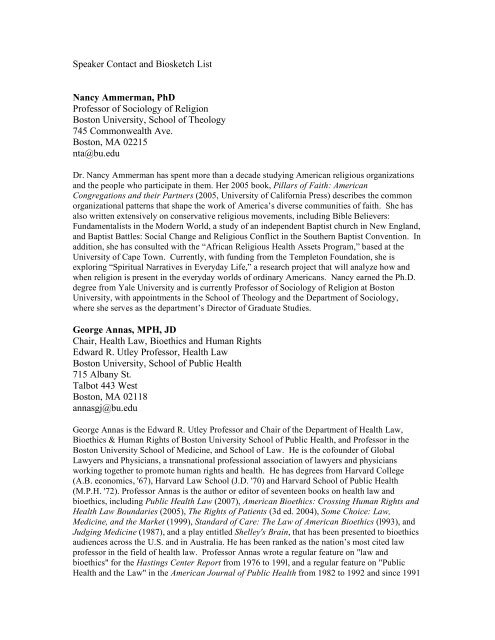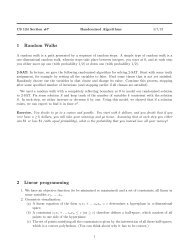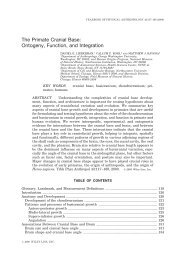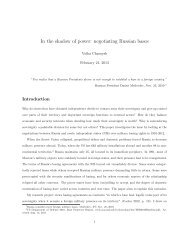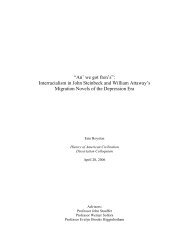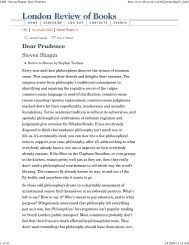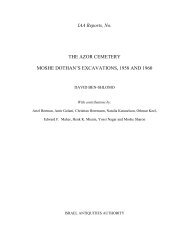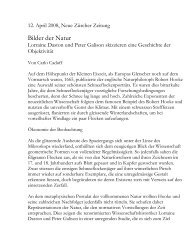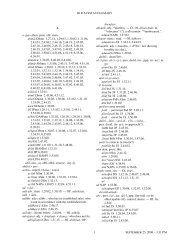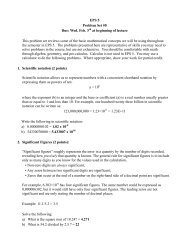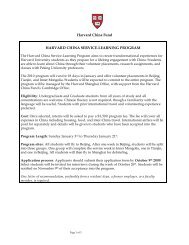Speaker Contact and Biosketch List Nancy Ammerman, PhD ...
Speaker Contact and Biosketch List Nancy Ammerman, PhD ...
Speaker Contact and Biosketch List Nancy Ammerman, PhD ...
You also want an ePaper? Increase the reach of your titles
YUMPU automatically turns print PDFs into web optimized ePapers that Google loves.
<strong>Speaker</strong> <strong>Contact</strong> <strong>and</strong> <strong>Biosketch</strong> <strong>List</strong><br />
<strong>Nancy</strong> <strong>Ammerman</strong>, <strong>PhD</strong><br />
Professor of Sociology of Religion<br />
Boston University, School of Theology<br />
745 Commonwealth Ave.<br />
Boston, MA 02215<br />
nta@bu.edu<br />
Dr. <strong>Nancy</strong> <strong>Ammerman</strong> has spent more than a decade studying American religious organizations<br />
<strong>and</strong> the people who participate in them. Her 2005 book, Pillars of Faith: American<br />
Congregations <strong>and</strong> their Partners (2005, University of California Press) describes the common<br />
organizational patterns that shape the work of America’s diverse communities of faith. She has<br />
also written extensively on conservative religious movements, including Bible Believers:<br />
Fundamentalists in the Modern World, a study of an independent Baptist church in New Engl<strong>and</strong>,<br />
<strong>and</strong> Baptist Battles: Social Change <strong>and</strong> Religious Conflict in the Southern Baptist Convention. In<br />
addition, she has consulted with the “African Religious Health Assets Program,” based at the<br />
University of Cape Town. Currently, with funding from the Templeton Foundation, she is<br />
exploring “Spiritual Narratives in Everyday Life,” a research project that will analyze how <strong>and</strong><br />
when religion is present in the everyday worlds of ordinary Americans. <strong>Nancy</strong> earned the Ph.D.<br />
degree from Yale University <strong>and</strong> is currently Professor of Sociology of Religion at Boston<br />
University, with appointments in the School of Theology <strong>and</strong> the Department of Sociology,<br />
where she serves as the department’s Director of Graduate Studies.<br />
George Annas, MPH, JD<br />
Chair, Health Law, Bioethics <strong>and</strong> Human Rights<br />
Edward R. Utley Professor, Health Law<br />
Boston University, School of Public Health<br />
715 Albany St.<br />
Talbot 443 West<br />
Boston, MA 02118<br />
annasgj@bu.edu<br />
George Annas is the Edward R. Utley Professor <strong>and</strong> Chair of the Department of Health Law,<br />
Bioethics & Human Rights of Boston University School of Public Health, <strong>and</strong> Professor in the<br />
Boston University School of Medicine, <strong>and</strong> School of Law. He is the cofounder of Global<br />
Lawyers <strong>and</strong> Physicians, a transnational professional association of lawyers <strong>and</strong> physicians<br />
working together to promote human rights <strong>and</strong> health. He has degrees from Harvard College<br />
(A.B. economics, '67), Harvard Law School (J.D. '70) <strong>and</strong> Harvard School of Public Health<br />
(M.P.H. '72). Professor Annas is the author or editor of seventeen books on health law <strong>and</strong><br />
bioethics, including Public Health Law (2007), American Bioethics: Crossing Human Rights <strong>and</strong><br />
Health Law Boundaries (2005), The Rights of Patients (3d ed. 2004), Some Choice: Law,<br />
Medicine, <strong>and</strong> the Market (1999), St<strong>and</strong>ard of Care: The Law of American Bioethics (l993), <strong>and</strong><br />
Judging Medicine (1987), <strong>and</strong> a play entitled Shelley's Brain, that has been presented to bioethics<br />
audiences across the U.S. <strong>and</strong> in Australia. He has been ranked as the nation’s most cited law<br />
professor in the field of health law. Professor Annas wrote a regular feature on "law <strong>and</strong><br />
bioethics" for the Hastings Center Report from 1976 to 199l, <strong>and</strong> a regular feature on "Public<br />
Health <strong>and</strong> the Law" in the American Journal of Public Health from 1982 to 1992 <strong>and</strong> since 1991
has written a regular feature for the New Engl<strong>and</strong> Journal of Medicine (“Health Law, Ethics &<br />
Human Rights”). He is a fellow of the American Association for the Advancement of Science, a<br />
member of the Institute of Medicine, <strong>and</strong> co-chair of the American Bar Association's Committee<br />
on Health Rights <strong>and</strong> Bioethics (Individual Rights <strong>and</strong> Responsibilities Section). He has also held<br />
a variety of government regulatory posts, including Vice Chair of the Massachusetts Board of<br />
Registration in Medicine, Chair of the Massachusetts Health Facilities Appeals Board, <strong>and</strong> Chair<br />
of the Massachusetts Organ Transplant Task Force.<br />
Carol Bellamy, JD<br />
President <strong>and</strong> CEO, World Learning<br />
Kipling Road, P.O. Box 676<br />
Brattleboro, Vermont 05302-0676<br />
carol.bellamy@worldlearning.org<br />
Carol Bellamy is the president <strong>and</strong> CEO of World Learning, a private, non-profit organization<br />
that promotes international <strong>and</strong> intercultural underst<strong>and</strong>ing through education <strong>and</strong> training,<br />
exchange <strong>and</strong> development activities in more than 75 countries on five continents. She is also<br />
president of World Learning’s School for International Training. Bellamy previously served 10<br />
years as executive director of UNICEF, the children’s agency of the United Nations. She was<br />
also the first former volunteer to become director of the Peace Corps. Bellamy has worked in the<br />
private sector at Bear Stearns & Co., Morgan Stanley <strong>and</strong> Co., <strong>and</strong> Cravath, Swaine <strong>and</strong> Moore.<br />
She spent 13 years as an elected public official, including five years in the New York state Senate.<br />
In 1978, she became the first woman to be elected president of the New York City Council, a<br />
position she held until 1985. In 2004, Bellamy was named to Forbes magazine’s 100 Most<br />
Powerful Women in the World.<br />
Solomon Benatar, MBChB, <strong>PhD</strong><br />
Professor of Medicine, Director University of Cape Town Bioethics Center<br />
University of Cape Town<br />
Department of Medicine, Bioethics Centre Observatory<br />
Cape Town 7701<br />
South Africa<br />
sbenatar@uctgsh1.uct.ac.za<br />
Solomon Benatar is Professor of Medicine at the University of Cape Town, Founding Director of<br />
the UCT Bioethics Center <strong>and</strong> Program Director of the International Research Ethics Network for<br />
Southern Africa, a US NIH Fogarty International Center funded capacity building program. He<br />
was Professor of Medicine, Chairman of the University of Cape Town’s Department of Internal<br />
Medicine <strong>and</strong> Chief Physician at Groote Schuur Hospital from 1980-1999 <strong>and</strong> President of the<br />
International Association of Bioethics from 2001-2003. He has been an annual Visiting Professor<br />
in Medicine <strong>and</strong> Public Health Sciences at the University of Toronto since 2000. His academic<br />
interests have included respiratory diseases, health services, academic freedom, human rights,<br />
medical ethics, international research ethics, HIV/AIDS <strong>and</strong> global health on which he has<br />
published widely. He is an elected Fellow of the Royal Society of South Africa, an elected<br />
foreign member of the US National Academy of Sciences` Institute of Medicine <strong>and</strong> of the<br />
American Academy of Arts <strong>and</strong> Sciences. In 2005 he was elected as a Fellow of Imperial College<br />
London.
Homi Bhabha, <strong>PhD</strong><br />
Anne F. Rothenberg Professor of the Humanities<br />
Director of the Humanities Center<br />
Harvard University, Dept. of English & American Literature<br />
Barker Center, 12 Quincy St.<br />
Cambridge MA 02138<br />
hbhabha@fas.harvard.edu<br />
Homi K. Bhabha is Anne F. Rothenberg Professor of the Humanities, Department of English,<br />
Harvard University; Director of the Humanities Center at Harvard; <strong>and</strong> Distinguished Visiting<br />
Professor in the Humanities at University College, London. His book, Location of Culture, has<br />
been translated into Korean, Spanish, Italian, German, Arabic, French, <strong>and</strong> Portuguese. Most<br />
recently, he completed the introduction to a new translation of Franz Fanon's The Wretched of the<br />
Earth. He has delivered the Presidential Lectures at the Freie Universität Berlin <strong>and</strong> at Stanford<br />
University. Other recent keynote addresses include: “State of the World” forum at the Gulbenkian<br />
Foundation (Lisbon); Scope II: Sites <strong>and</strong> Sounds-Narrating Heritage (Vienna); the Goethe-Institut<br />
meeting of international directors; the Volkswagen Foundation “Boundaries: Differences”<br />
conference (Dresden); Colloquium on Research <strong>and</strong> Higher Education organized by UNESCO;<br />
<strong>and</strong> the Beckman Lectures at the UC, Berkeley. Also, he has served twice as a Faculty Advisor to<br />
the DAVOS World Economic Forum. Newsweek named him one of “100 Americans for the Next<br />
Century.” Educated at the University of Bombay <strong>and</strong> the University of Oxford, Bhabha advises<br />
key arts institutions <strong>and</strong> is a regular contributor to Artforum. He has published widely in journals<br />
including New Formations, October, Oxford Literary Review <strong>and</strong> Screen. He sits on the editorial<br />
board of, amongst others, October, Critical Inquiry, <strong>and</strong> New Formations. Bhabha is currently at<br />
work on A Measure of Dwelling, a theory of vernacular cosmopolitanism forthcoming from<br />
Harvard University Press, <strong>and</strong> The Right to Narrate, forthcoming from Columbia University<br />
Press.<br />
Allan Br<strong>and</strong>t, <strong>PhD</strong><br />
Amalie Moses Kass Professor of the History of Medicine<br />
Harvard Medical School<br />
Department of Social Medicine<br />
641 Huntington Ave<br />
Boston MA 02115<br />
br<strong>and</strong>t@fas.harvard.edu<br />
Allan M. Br<strong>and</strong>t is the Amalie Moses Kass Professor of the History of Medicine at Harvard<br />
Medical School. He holds a joint appointment in the Department of the History of Science at<br />
Harvard University. Br<strong>and</strong>t earned his undergraduate degree at Br<strong>and</strong>eis University <strong>and</strong> a Ph.D.<br />
in American History from Columbia University in 1983. His work focuses on social <strong>and</strong> ethical<br />
aspects of health, disease, <strong>and</strong> medical practices in the twentieth-century United States. Br<strong>and</strong>t is<br />
the author of The Cigarette Century: The Rise, Fall, <strong>and</strong> Deadly Persistence of the Product That<br />
Defined America <strong>and</strong> No Magic Bullet: A Social History of Venereal Disease in the United States<br />
Since 1880. He has written on the social history of epidemic disease; the history of public health;<br />
<strong>and</strong> the history of human subject research among other topics.
Dan Brock, <strong>PhD</strong><br />
Frances Glessner Lee Professor of Medical Ethics<br />
Director of the Division of Medical Ethics HMS<br />
Director, Harvard University Program in Ethics <strong>and</strong> Health<br />
Harvard Medical School<br />
Department of Social Medicine<br />
641 Huntington Ave<br />
Boston MA 02115<br />
dan_brock@hms.harvard.edu<br />
Dan W. Brock is the Frances Glessner Lee Professor of Medical Ethics in the Department of<br />
Social Medicine <strong>and</strong> Director of the Division of Medical Ethics at the Harvard Medical School.<br />
He is also Director of the Harvard Program in Ethics <strong>and</strong> Health. Previously he was Senior<br />
Scientist <strong>and</strong> a member of the Department of Clinical Bioethics at the National Institutes of<br />
Health. Until July 2002, he was Charles C. Tillinghast, Jr. University Professor, Professor of<br />
Philosophy <strong>and</strong> Biomedical Ethics, <strong>and</strong> Director of the Center for Biomedical Ethics at Brown<br />
University where he had a joint appointment in the Philosophy Department (of which he was<br />
Chair in 1980-86) <strong>and</strong> in the Medical School. He received his B.A. in economics from Cornell<br />
University <strong>and</strong> his Ph.D. in philosophy from Columbia University.<br />
He served as Staff Philosopher on the President's Commission for the Study of Ethical<br />
Problems in Medicine in 1981-82, <strong>and</strong> in 1993 was a member of the Ethics Working Group of the<br />
Clinton Task Force on National Health Reform. He has been a consultant in biomedical ethics<br />
<strong>and</strong> health policy to numerous national <strong>and</strong> international bodies, including the National Bioethics<br />
Advisory Commission, <strong>and</strong> the World Health Organization. He is an elected member of the<br />
Institute of Medicine <strong>and</strong> a fellow <strong>and</strong> former Board member of the Hastings Center. He was<br />
President of the American Association of Bioethics in 1995-96, <strong>and</strong> was a founding Board<br />
Member of the American Society for Bioethics <strong>and</strong> Humanities.<br />
He is the author of over 150 articles in bioethics <strong>and</strong> in moral <strong>and</strong> political philosophy,<br />
which have appeared in books <strong>and</strong> peer-reviewed scholarly journals, including the New Engl<strong>and</strong><br />
Journal of Medicine, JAMA, Science, Hastings Center Report, Philosophy <strong>and</strong> Public Affairs, <strong>and</strong><br />
Ethics. He is the author of Deciding For Others: The Ethics of Surrogate Decision Making, 1989,<br />
(with Allen E. Buchanan), Life <strong>and</strong> Death: Philosophical Essays in Biomedical Ethics, 1993, <strong>and</strong><br />
From Chance to Choice: Genetics <strong>and</strong> Justice (with Allen Buchanan, Norman Daniels <strong>and</strong> Daniel<br />
Wikler) 2000, all published by Cambridge University Press. He is currently an editorial board<br />
member of 14 professional journals in ethics, bioethics <strong>and</strong> health policy, <strong>and</strong> has lectured widely<br />
at national <strong>and</strong> international conferences, professional societies, universities, <strong>and</strong> health care<br />
institutions. His current research focuses on the prioritization of health resources <strong>and</strong> rationing,<br />
with a special focus on cost-effectiveness analysis, <strong>and</strong> on genetic selection for enhancement <strong>and</strong><br />
to prevent disability<br />
David Canning, <strong>PhD</strong><br />
Department of Population <strong>and</strong> International Health<br />
SPH I<br />
1211, 12th Floor<br />
665 Huntington Avenue<br />
Boston, MA 02115<br />
dcanning@hsph.harvard.edu
Richard Cash<br />
Senior Lecturer on International Health<br />
Department of Population <strong>and</strong> International Health<br />
665 Huntington Avenue<br />
Building I, Room 1106c<br />
Boston, MA 02115<br />
617.432.1076<br />
racash@hsph.harvard.edu<br />
Dr. Richard A. Cash is presently the Principal Investigator of a NIH training grant on "Ethical<br />
Issues in International Health Research". This program explores differences between <strong>and</strong> within<br />
countries with regard to health research ethics <strong>and</strong> conducts training workshops. In addition to<br />
workshops conducted at the HSPH, workshops are planned for Mexico, South Africa, <strong>and</strong> Kerala<br />
in South India. Informed consent, confidentiality, conflict of interest, investigator responsibilities<br />
to the study population, research in resource poor environments, <strong>and</strong> the development of ethical<br />
review committees are just some of the subjects covered in the different workshops. Dr. Cash was<br />
previously the Principal Investigator of the Applied Diarrheal Disease Research (ADDR) Project,<br />
a program, which assisted developing country scientists to develop their research abilities by<br />
conducting their own research projects. Over 150 studies, involving more than 350 investigators<br />
were funded in twelve countries in Africa, Asia, <strong>and</strong> Latin America leading to over 275<br />
publications. The research priorities of the program focused on the following areas: behavioral<br />
studies of care takers <strong>and</strong> providers; foods <strong>and</strong> fluids; prevention of diarrhea; persistent <strong>and</strong><br />
evasive diarrhea; <strong>and</strong> acute respiratory infection <strong>and</strong> nutrition. The ADDR Project has been<br />
replaced by the Applied Research for Child Health (ARCH) Project which has further exp<strong>and</strong>ed<br />
its work. A number of studies were pursued by ADDR <strong>and</strong> now ARCH to explore the process by<br />
which researchers are trained <strong>and</strong> how research results are translated into policy <strong>and</strong> program<br />
implementation.<br />
Sarah Coakley, <strong>PhD</strong>, ThM, Dr. Theology<br />
Edward Mallinckrodt, Jr., Professor of Divinity<br />
Harvard Divinity School<br />
Divinity Hall, Room 305<br />
Cambridge MA 02138<br />
Sarah Coakley taught at Lancaster <strong>and</strong> Oxford Universities before coming to Harvard Divinity<br />
School in 1993. She became the Mallinckrodt Professor in 1995. A systematic theologian <strong>and</strong><br />
philosopher of religion, she has wide interdisciplinary interests, as reflected in her research <strong>and</strong><br />
teaching. Her most recent books are Powers <strong>and</strong> Submissions: Spirituality, Philosophy <strong>and</strong><br />
Gender (2002) <strong>and</strong> Re-Thinking Gregory of Nyssa (ed., 2003). She is currently completing a coedited<br />
volume, Pain <strong>and</strong> Its Transformations (2007), a product of her work in the<br />
interdisciplinary "Mind, Brain, Behavior" group at Harvard; <strong>and</strong> she is at work on a four-volume<br />
systematic theology, the first volume of which will appear as God, Sexuality <strong>and</strong> the Self: An<br />
Essay 'On the Trinity' (forthcoming). Previous works include Christ Without Absolutes: A Study<br />
of the Christology of Ernst Troeltsch, <strong>and</strong> an edited volume on comparative religion, Religion <strong>and</strong><br />
the Body. She co-chaired (in 2004) a Templeton Foundation symposium on spiritual healing,<br />
from which an edited volume is being produced; <strong>and</strong> she is a recent recipient of a Templeton<br />
award for her course "Medicine <strong>and</strong> Religion" (co-taught with Arthur Kleinman at Harvard<br />
Medical School). From 2005 to 2008 she is co-directing (with Martin Nowak, Center of<br />
Evolutionary Dynamics) a new $2 million research project ("The Theology of Cooperation") on
theology, evolutionary biology, <strong>and</strong> game theory, also funded by the Templeton Foundation.<br />
Professor Coakley is an ordained priest of the Church of Engl<strong>and</strong>, <strong>and</strong> assists in parishes in<br />
Waban, Massachusetts, <strong>and</strong> in Littlemore, Oxford, Engl<strong>and</strong>.<br />
Veena Das, <strong>PhD</strong><br />
Krieger-Eisenhower Professor<br />
Chair Department of Anthropology, Johns Hopkins University,<br />
404F Macaulay Hall<br />
3400 North Charles Street, Baltimore, MD 21218<br />
veenadas@jhu.edu<br />
Veena Das is the Krieger-Eisenhower Professor of Anthropology at Johns Hopkins<br />
University. She has researched extensively on collective violence, everyday life <strong>and</strong> social<br />
suffering. Currently she is engaged in a longitudinal study on poverty <strong>and</strong> urban health in<br />
India. Her recent books include Critical Events: An anthropological Perspective on<br />
Contemporary India, Oxford University Press, 1995 <strong>and</strong> three volumes on the themes of social<br />
suffering, violence <strong>and</strong> subjectivity <strong>and</strong> remaking everyday life after traumatic violence of which<br />
she is a co-editor. She taught in the University of Delhi for thirty-three years. She is on the<br />
executive board of the Institute for Social <strong>and</strong> Economic Research in Development <strong>and</strong><br />
Democracy in Delhi <strong>and</strong> the International Center for Ethnic Studies in Colombo. She is a foreign<br />
honorary member of the American Academy of Arts <strong>and</strong> Sciences <strong>and</strong> received an honorary<br />
doctorate from the University of Chicago.<br />
Souleymane Bachir Diagne, <strong>PhD</strong><br />
Professor of Philosophy<br />
Northwestern University<br />
1880 Campus Dr. #2-335<br />
Evanston, IL 60208-2164<br />
s-diagne@northwestern.edu<br />
Souleymane Bachir Diagne is Professor of Philosophy <strong>and</strong> Religion at Northwestern University.<br />
He is also a faculty member of the Program of African studies. An alumnus of Ecole Normale<br />
Superieure in Paris, he obtained his <strong>PhD</strong> in philosophy at the University of Sorbonne. His field of<br />
research includes history of algebraic logic, Islamic philosophy <strong>and</strong> Mysticism (Sufism) <strong>and</strong><br />
cultural studies. His first publication was a presentation, in French, of George Boole’s algebra of<br />
Logic: Boole, l’oiseau de nuit en plein jour (Paris. Belin. 1989) [ Boole, a nightbird in the<br />
daylight] . His most recent book, Islam et société ouverte, la fidélité et le mouvement dans la<br />
pensée de Muhammad Iqbal (Paris. Maisonneuve & Larose. 2001)[ Islam <strong>and</strong> the open society:<br />
Fidelity <strong>and</strong> movement in Muhammad Iqbal’s Thought] is an introduction to the thought of one of<br />
the greatest modernist philosophers of the Muslim world: the Indian poet Muhammad Iqbal. He<br />
has also published in 2002 a lexicon titled Cent mots pour dire l’Islam, or, in English: A hundred<br />
definitions to underst<strong>and</strong> Islam. In the field of African philosophy, among other titles, Diagne has<br />
published “Africanity as an open question.” In Identity <strong>and</strong> beyond: rethinking Africanity.
Ruth Faden, <strong>PhD</strong>, MPH<br />
Professor, Department of Health Policy <strong>and</strong> Management<br />
Johns Hopkins Bloomberg School of Public Health<br />
Executive Director<br />
Johns Hopkins Berman Institute of Bioethics<br />
Philip Franklin Wagley Professor in Biomedical Ethics<br />
Hampton House 352<br />
624 North Broadway<br />
Baltimore, MD 21205<br />
rfaden@jhsph.edu<br />
Ruth R. Faden, Ph.D., M.P.H. is the Philip Franklin Wagley Professor of Biomedical Ethics <strong>and</strong><br />
Executive Director of The Phoebe R. Berman Bioethics Institute at Johns Hopkins University.<br />
She is also a Senior Research Scholar at the Kennedy Institute of Ethics, Georgetown University.<br />
Dr. Faden is the author <strong>and</strong> editor of numerous books <strong>and</strong> articles on biomedical ethics <strong>and</strong> health<br />
policy including Social Justice: The Moral Foundations of Public Health <strong>and</strong> Health Policy (with<br />
Madison Powers), A History <strong>and</strong> Theory of Informed Consent (with Tom Beauchamp), AIDS,<br />
Women <strong>and</strong> the Next Generation (Ruth Faden, Gail Geller <strong>and</strong> Madison Powers, eds.), HIV, AIDS<br />
<strong>and</strong> Childbearing: Public Policy, Private Lives (Ruth Faden <strong>and</strong> <strong>Nancy</strong> Kass, eds.). Dr. Faden is<br />
a member of the Institute of Medicine <strong>and</strong> a Fellow of the Hastings Center <strong>and</strong> the American<br />
Psychological Association. She has served on several national advisory committees <strong>and</strong><br />
commissions, including the President's Advisory Committee on Human Radiation Experiments,<br />
which she chaired. Dr. Faden holds a BA from the University of Pennsylvania, an MA in General<br />
Studies in Humanities from the University of Chicago <strong>and</strong> an MPH <strong>and</strong> Ph.D. (Program in<br />
Attitudes <strong>and</strong> Behavior) from the University of California, Berkeley.<br />
Paul Farmer, MD, <strong>PhD</strong><br />
The Maude <strong>and</strong> Lillian Presley Professor of Social Medicine<br />
Harvard Medical School<br />
Dept. of Social Medicine<br />
641 Huntington Ave<br />
Boston MA 02115<br />
paulhaiti@aol.com<br />
Medical anthropologist <strong>and</strong> physician Paul Farmer is a founding director of Partners In Health, an<br />
international charity organization that provides direct health care services <strong>and</strong> undertakes research<br />
<strong>and</strong> advocacy activities on behalf of those who are sick <strong>and</strong> living in poverty. Dr. Farmer’s work<br />
draws primarily on active clinical practice (he is an attending physician in infectious diseases <strong>and</strong><br />
chief of the Division of Social Medicine <strong>and</strong> Health Inequalities at Brigham <strong>and</strong> Women’s<br />
Hospital (BWH) in Boston, <strong>and</strong> medical director of a charity hospital, the Clinique Bon Sauveur,<br />
in rural Haiti) <strong>and</strong> focuses on diseases that disproportionately afflict the poor. Along with his<br />
colleagues at BWH, in the Program in Infectious Disease <strong>and</strong> Social Change at Harvard Medical<br />
School, <strong>and</strong> in Haiti, Peru, <strong>and</strong> Russia, Dr. Farmer has pioneered novel, community-based<br />
treatment strategies for AIDS <strong>and</strong> tuberculosis (including multidrug-resistant tuberculosis). Dr.<br />
Farmer <strong>and</strong> his colleagues have successfully challenged the policymakers <strong>and</strong> critics who claim<br />
that quality health care is impossible to deliver in resource-poor settings. Dr. Farmer has written<br />
extensively about health <strong>and</strong> human rights, <strong>and</strong> about the role of social inequalities in the
distribution <strong>and</strong> outcome of infectious diseases. He is the author of Pathologies of Power<br />
(University of California Press, 2003), Infections <strong>and</strong> Inequalities (University of California Press,<br />
1998), The Uses of Haiti (Common Courage Press, 1994), <strong>and</strong> AIDS <strong>and</strong> Accusation (University<br />
of California Press, 1992). In addition, he is co-editor of Women, Poverty, <strong>and</strong> AIDS (Common<br />
Courage Press, 1996) <strong>and</strong> of The Global Impact of Drug-Resistant Tuberculosis (Harvard<br />
Medical School <strong>and</strong> Open Society Institute, 1999).<br />
Steve Feierman, <strong>PhD</strong><br />
Professor of History<br />
University of Pennsylvania<br />
322 Logan Hall<br />
Philadelphia, PA 19104-6379<br />
FEIERMAN@SAS.UPENN.EDU<br />
Steven Feierman is a historian <strong>and</strong> ethnographer of medicine in Africa. He is the author of several<br />
books, including Peasant Intellectuals, The Shambaa Kingdom, <strong>and</strong> (as co-editor) The Social<br />
Basis of Health <strong>and</strong> Healing in Africa. He is currently completing a book manuscript on the<br />
history of local forms of social medicine across eastern, central, <strong>and</strong> southern Africa. Feierman<br />
has lived <strong>and</strong> worked periodically in Tanzania over several decades. He is Professor of History &<br />
Sociology of Science at the University of Pennsylvania. Feierman received a Ph.D. in African<br />
History from Northwestern University <strong>and</strong> a D.Phil. in Social Anthropology from Oxford. He<br />
also completed an apprenticeship as a traditional healer in East Africa.<br />
Julio Frenk<br />
Senior Fellow<br />
Global Health Program, Bill <strong>and</strong> Melinda Gates Foundation<br />
Former Minister of Health, Mexico<br />
jfrenk@prodigy.net.mx<br />
Julio Frenk recently concluded his six-year term as the Minister of Health of Mexico. In addition<br />
to strengthening public health programs, his central contribution was an ambitious reform to<br />
provide universal health insurance. This program is exp<strong>and</strong>ing access to quality care <strong>and</strong> financial<br />
protection for 50 million Mexicans, most of them poor <strong>and</strong> uninsured. Since February 1, 2007,<br />
Julio Frenk is Senior Fellow at the Global Health Program of the Bill <strong>and</strong> Melinda Gates<br />
Foundation, where he provides advice on strategies <strong>and</strong> programs. His career has also included<br />
executive positions at the World Health Organization <strong>and</strong> the Mexican Health Foundation. He<br />
was the founding Director-General of the National Institute of Public Health of Mexico, was a<br />
Visiting Professor at Harvard University, <strong>and</strong> was awarded the position of National Researcher in<br />
his country. He is a member of several professional associations, including the National Academy<br />
of Medicine of Mexico <strong>and</strong> the Institute of Medicine of the National Academy of Science in the<br />
United States. His written production includes 29 books <strong>and</strong> monographs, 49 book chapters, 94<br />
articles in academic journals, <strong>and</strong> 106 articles in cultural periodicals <strong>and</strong> newspapers. Two of his<br />
books are best-selling novels for youngsters explaining the functions of the human body.
Dr. Frenk holds a medical degree from the National University of Mexico, as well as a Master’s<br />
of Public Health <strong>and</strong> a joint doctorate in Medical Care Organization <strong>and</strong> in Sociology from the<br />
University of Michigan. In summary, Dr. Julio Frenk has gained substantial experience over a 25year<br />
career covering leadership positions in all major aspects of public health: research, teaching,<br />
independent policy analysis, institution building, international cooperation, <strong>and</strong> national public<br />
service.<br />
Renee Fox, <strong>PhD</strong><br />
Annenberg Professor Emerita of the Social Sciences<br />
University of Pennsylvania<br />
3718 Locust Walk, McNeil Building, Ste. 113<br />
Philadelphia, PA 19104-6299<br />
rcfox@ssc.upenn.edu<br />
Renée C. Fox, a summa cum laude graduate of Smith College, earned her Ph.D. in Sociology in<br />
1954 from Harvard University, where she studied in the Department of Social Relations. Before<br />
joining the faculty of the University of Pennsylvania in 1969, she was a member of the Columbia<br />
University Bureau of Applied Social Research, taught for twelve years at Barnard College, <strong>and</strong><br />
then spent two years as a Visiting Lecturer in the Department of Social Relations at Harvard. At<br />
the University of Pennsylvania, she was a professor in the Department of Sociology with joint,<br />
secondary appointments in the Departments of Psychiatry <strong>and</strong> Medicine, <strong>and</strong> in the School of<br />
Nursing; <strong>and</strong> she held an interdisciplinary chair as the Annenberg Professor of the Social<br />
Sciences. On July 1, 1998, she became the Annenberg Professor Emerita of the Social Sciences.<br />
She is also an Emerita Senior Fellow of the Center for Bioethics, <strong>and</strong> a member of the Affiliated<br />
Faculty of the Solomon Asch Center for the Study of Ethnopolitical Conflict at the University of<br />
Pennsylvania.<br />
Renée Fox’s major teaching <strong>and</strong> research interests – sociology of medicine, medical<br />
research, medical education, ad medical ethics – have involved her in first-h<strong>and</strong>, participant<br />
observation-based studies in Continental Europe (particularly in Belgium), in Central Africa<br />
(especially in the Democratic Republic of the Congo), <strong>and</strong> in the People’s Republic of China, as<br />
well as in the United States. She has lectured in colleges, universities, <strong>and</strong> medical schools<br />
throughout the United States, <strong>and</strong> has taught in a number of universities abroad. During the 1996-<br />
1997 academic year, she was the George Eastman Visiting Professor at the University of Oxford.<br />
She is the author of seven books <strong>and</strong> numerous articles. Her best-known books are Experiment<br />
Perilous: Physicians <strong>and</strong> Patients Facing the Unknown; The Courage to Fail: A Social View of<br />
Organ Transplants <strong>and</strong> Dialysis, <strong>and</strong> Spare Parts: Organ Replacement in American Society (both<br />
of which were written with medical historian Judith P. Swazey); <strong>and</strong> In the Belgian Château: The<br />
Spirit <strong>and</strong> Culture of a European Society in an Age of Change. She has recently finished writing<br />
another book coauthored with Judith Swazey, tentatively entitled Observing Bioethics; <strong>and</strong> she is<br />
in the process of completing the sociological case study of Médecins Sans Frontières (MSF) that<br />
she has been conducting since 1994, which is focused on the medical humanitarian <strong>and</strong> human<br />
rights witnessing <strong>and</strong> advocacy action in which MSF engages – its underlying ideology <strong>and</strong><br />
value-commitments, the moral dilemmas it entails, <strong>and</strong> its unintended as well as intended<br />
consequences.<br />
Fox is a member of the American Academy of Arts <strong>and</strong> Sciences, <strong>and</strong> of the Institute of<br />
Medicine of the National Academy of Sciences, a Fellow of the American Association for the<br />
Advancement of Science, <strong>and</strong> an Honorary Member of Alpha Omega Alpha Honor Medical<br />
Society. She is the holder of a Radcliffe Graduate School Medal, <strong>and</strong> of a Centennial Medal from<br />
the Graduate School of Arts <strong>and</strong> Sciences of Harvard University, <strong>and</strong> a recipient of the American<br />
Sociological Association’s Leo G. Reeder Award for Distinguished Contributions to Medical
Sociology. She has received several teaching awards: an E. Harris Harbison Gifted Teaching<br />
Award of the Danforth Foundation, <strong>and</strong> a Lindback Foundation Award for Teaching at the<br />
University of Pennsylvania. She holds nine honorary degrees, <strong>and</strong> in 1995, she was named<br />
Chevalier of the Order of Leopold II by the Belgian Government.<br />
Roger Glass, MD, <strong>PhD</strong><br />
Director, Fogarty International Center<br />
Associate Director for International Research, NIH<br />
Fogarty International Center<br />
National Institutes of Health<br />
Building 31, Room B2C29, 31 Center Drive - MSC 2220<br />
Bethesda, MD 20892-2220<br />
glassr@mail.nih.gov<br />
Dr. Glass was named Director of the Fogarty International Center <strong>and</strong> Associate Director for<br />
International Research by NIH Director Elias A. Zerhouni, M.D., on March 31, 2006. He<br />
formally took office on June 11, 2006. (An article profiling Dr. Glass appeared in the NIH Record<br />
on June 2, 2006.) Dr. Glass graduated from Harvard College in 1967, received a Fulbright<br />
Fellowship to study at the University of Buenos Aires in 1967, <strong>and</strong> received his M.D. from<br />
Harvard Medical School <strong>and</strong> his M.P.H. from the Harvard School of Public Health in 1972. He<br />
joined the Centers for Disease Control <strong>and</strong> Prevention in 1977 as a medical officer assigned to the<br />
Environmental Hazards Branch. He received his doctorate from the University of Goteborg,<br />
Sweden in 1984, <strong>and</strong> joined the National Institutes of Health Laboratory of Infectious Diseases,<br />
where he worked on the molecular biology of rotavirus. In 1986, Dr. Glass returned to the CDC<br />
to become Chief of the Viral Gastroenteritis Unit at the National Center for Infectious Diseases.<br />
Dr. Glass's research interests are in the prevention of gastroenteritis from rotaviruses <strong>and</strong><br />
nonviruses through the application of novel scientific research. He has maintained field studies in<br />
India, Bangladesh, Brazil, Mexico, Israel, Russia, Vietnam, China <strong>and</strong> elsewhere. His research<br />
has been targeted toward epidemiologic studies to anticipate the introduction of rotavirus<br />
vaccines. He is fluent <strong>and</strong> often lectures in 5 languages.<br />
Dr. Glass has received numerous awards, including the Secretary’s Award for<br />
Distinguished Service (DHHS), the Outst<strong>and</strong>ing Unit Citation from the National Center for<br />
Infectious Diseases, the Outst<strong>and</strong>ing Service Medal from the U.S. Public Health Service, <strong>and</strong> a<br />
Commendation Medal from the U.S. Public Health Service. He is a member of the U.S. National<br />
Academy of Science’s Institute of Medicine, the American Academy of Microbiology, the<br />
American Society of Microbiology, the American Association for the Advancement of Science,<br />
the American Society of Virology, <strong>and</strong> the American Epidemiological Society. Dr. Glass is also a<br />
fellow in the Infectious Disease Society <strong>and</strong> the American College of Epidemiology. Dr. Glass<br />
has co-authored more than 400 research papers <strong>and</strong> chapters. He is married to Barbara Stoll, M.D.,<br />
the George W. Brumley, Jr. Professor <strong>and</strong> Chair of the Department of Pediatrics at Emory<br />
University School of Medicine <strong>and</strong> the Medical Director of the Children’s Healthcare of Atlanta<br />
at Egleston. He <strong>and</strong> his wife have three children.<br />
Jane Guyer, <strong>PhD</strong><br />
Professor of Anthropology<br />
Johns Hopkins University<br />
404 Macaulay Hall<br />
3400 North Charles Street, Baltimore, MD 21218<br />
jiguyer@jhu.edu
Jane I Guyer is Professor of Anthropology at Johns Hopkins University. Her fieldwork has<br />
concentrated in West Africa, from which she has published on the dynamics of economic change.<br />
One main track has been in the study of production, including household, community <strong>and</strong><br />
regional ecological <strong>and</strong> market changes (Family <strong>and</strong> Farm in Southern Cameroon; Feeding<br />
African Cities; An African Niche Economy; <strong>and</strong> most recently a special issue of Human Ecology<br />
devoted to Time <strong>and</strong> African L<strong>and</strong> Use). Another track is in the history of money (Money Matters;<br />
Money Struggles <strong>and</strong> City Life; Marginal Gains). Her most recent <strong>and</strong> forthcoming publications<br />
relate to economic concepts in present-day public life: temporality, price, <strong>and</strong> the intelligibility of<br />
the market.<br />
Allan Hill, <strong>PhD</strong><br />
Andelot Professor of Demography<br />
Harvard School of Public Health<br />
Bldg 1, 11th Flr<br />
665 Huntington Ave.,<br />
Boston MA 02115<br />
Allan G. Hill has been the Andelot Professor of Demography at Harvard University since 1991.<br />
He directs the Education Office of the Department of Population <strong>and</strong> International Health in the<br />
Harvard School of Public Health <strong>and</strong> teaches courses there on demography, measuring population<br />
health, reproduction <strong>and</strong> reproductive health <strong>and</strong> on the assessment of the impact of health<br />
programs. His work focuses on the health transitions <strong>and</strong> their determinants in the Arab world<br />
<strong>and</strong> West Africa. Research in Mali <strong>and</strong> The Gambia included studies of the impact of selected<br />
health interventions <strong>and</strong> of the factors supporting high fertility. He recently directed the<br />
Women’s Health Study of Accra whilst on leave at the University of Ghana 2002-4. He served as<br />
the Secretary-General of the International Union for the Scientific Study of Population for eight<br />
years. He has served on the faculty of the School of Health Sciences, the American University of<br />
Beirut <strong>and</strong> the Medical School, University of Jordan, the Ghana School of Public Health <strong>and</strong><br />
collaborates with the Social Research Center, American University in Cairo. In addition to his<br />
university career, Dr. Hill was for four years the first regional representative for the Population<br />
Council in the Middle East <strong>and</strong> North Africa based in Beirut <strong>and</strong> Amman.<br />
Richard Horton, MD<br />
Editor-in-Chief, The Lancet<br />
32 Jamestown Road<br />
London, NW1 7BY<br />
United Kingdom<br />
Richard.horton@lancet.com<br />
Richard Horton qualified in medicine from the University of Birmingham in 1986. He completed<br />
his general medical training in Birmingham before moving to the liver unit at the Royal Free<br />
Hospital. In 1990, he joined The Lancet as an assistant editor <strong>and</strong> moved to New York as North<br />
American editor in 1993. Two years later he returned to the UK to become Editor-in-Chief. He<br />
was the first President of the World Association of Medical Editors, <strong>and</strong> is presently a member of<br />
the International Committee of Medical Journal Editors. He is an honorary professor at the<br />
London School of Hygiene <strong>and</strong> Tropical Medicine, <strong>and</strong> a Founder Fellow of the Academy of<br />
Medical Sciences. A book about controversies in modern medicine, Second Opinion, was<br />
published in 2003.
Steven Hyman, MD<br />
Provost, Harvard University<br />
Professor of Neurobiology<br />
University Hall, Harvard Yard<br />
Cambridge MA 02138<br />
steven_hyman@harvard.edu<br />
Steven E. Hyman, MD is Provost of Harvard University <strong>and</strong> Professor of Neurobiology at<br />
Harvard Medical School. From 1996 to 2001, he served as Director of the National Institute of<br />
Mental Health (NIMH), the component of the US National Institutes of Health charged with<br />
generating the knowledge needed to underst<strong>and</strong> <strong>and</strong> treat mental illness. Before serving as<br />
Director of NIMH, Dr. Hyman was Professor of Psychiatry at Harvard Medical School, Director<br />
of Psychiatry Research at Massachusetts General Hospital, <strong>and</strong> the first faculty Director of<br />
Harvard University's Mind, Brain, <strong>and</strong> Behavior Initiative. In the laboratory he studied the<br />
regulation of gene expression by neurotransmitters, especially dopamine, <strong>and</strong> drugs that act on<br />
dopamine receptors. Dr. Hyman is a member of the Institute of Medicine of the National<br />
Academy of Sciences, a Fellow of the American Academy of Arts <strong>and</strong> Sciences, <strong>and</strong> a Fellow of<br />
the American College of Neuropsychopharmacology. He is Editor of the Annual Review of<br />
Neuroscience. He received his BA from Yale College in 1974 summa cum laude, <strong>and</strong> his MA<br />
from the University of Cambridge in 1976, which he attended as a Mellon fellow studying the<br />
history <strong>and</strong> philosophy of science. He earned his MD from Harvard Medical School in 1980 cum<br />
laude.<br />
Carel Ijsselmuiden, MD, MPH, FFCH<br />
Director, Council on Health Research for Development (COHRED)<br />
COHREDc/o Ecumenical Centre/Centre Oecuménique<br />
1-5 Route des Morillons, 1211<br />
Geneva, Switzerl<strong>and</strong><br />
carel@cohred.ch<br />
Carel IJsselmuiden is Director of the Council on Health Research for Development (COHRED),<br />
an international non-governmental organisation with headquarters in Geneva. Its mission is to<br />
make research work for health <strong>and</strong> equity in low <strong>and</strong> middle-income countries. He was the<br />
founding Director of the School of Health Systems <strong>and</strong> Public Health at the University of Pretoria,<br />
South Africa, until he joined COHRED in 2004. Prior to this, he worked in rural <strong>and</strong> urban public<br />
health in South Africa since 1980. He holds medical <strong>and</strong> public health qualifications, has<br />
published widely in several areas, <strong>and</strong> has received awards for his work in epidemiology <strong>and</strong><br />
public health. His professional interests focus on capacity building, rural health <strong>and</strong> development,<br />
international health research ethics, epidemiology, environmental health <strong>and</strong> health research<br />
systems development in developing countries. He was the principal investigator <strong>and</strong> remains<br />
executive member of the Southern African Research Ethics Training Initiative (SARETI), which<br />
is funded through the Fogarty International Center of the NIH. He is adjunct professor in the<br />
School of Psychology at the University of KwaZulu Natal, South Africa, consults to the South<br />
African HIV/AIDS Vaccine Ethics Group (HAVEG), teaches an annual international research
ethics course at the University of KwaZulu Natal <strong>and</strong> at the Institute of Public Health at the<br />
Makerere University in Ug<strong>and</strong>a. Prof IJsselmuiden is married <strong>and</strong> has 3 children. Since 2006, he<br />
is guiding the development of the Global Forum on Bioethics in Research that is hosted at<br />
COHRED.<br />
Dean Jamison, <strong>PhD</strong><br />
Professor of Health Economics<br />
Box 1224, 50 Beale Street 1200<br />
University of California, San Francisco<br />
San Francisco, CA. 94143 - 1224<br />
djamison@globalhealth.ucsf.edu<br />
In July 2006 Jamison became Professor of Development Economics at the University of<br />
California, San Francisco <strong>and</strong>, concurrently (for 2006-08) the T. & G. Angelopoulos Visiting<br />
Professor of Public Health <strong>and</strong> International Development in the Kennedy School of Government<br />
<strong>and</strong> the School of Public Health, Harvard University. Before joining the UCSF <strong>and</strong> Harvard<br />
faculties, Jamison had been at UCLA (1988-2006) <strong>and</strong> previously at the World Bank where he<br />
was a senior economist in the research department, division chief for education policy, <strong>and</strong><br />
division chief for population, health <strong>and</strong> nutrition. In 1992-93 he temporarily rejoined the World<br />
Bank to serve as Director of the World Development Report Office <strong>and</strong> as lead author for the<br />
Bank’s 1993 World Development Report, Investing in Health. His publications are in the areas<br />
of economic theory, public health <strong>and</strong> education. Jamison recently led the Disease Control<br />
Priorities Project, for which he was senior editor of Disease Control Priorities in Developing<br />
Countries, 2nd edition, <strong>and</strong> an editor of Global Burden of Disease <strong>and</strong> Risk Factors, both<br />
published by Oxford University Press in 2006. Jamison studied at Stanford (A.B., Philosophy;<br />
M.S., Engineering Sciences) <strong>and</strong> at Harvard (Ph.D., Economics, under K.J. Arrow). In 1994 he<br />
was elected to membership in the Institute of Medicine of the U.S. National Academy of Sciences.<br />
Jamison has served frequently on advisory groups to national <strong>and</strong> international organizations <strong>and</strong><br />
currently chairs the Advisory Group on Economics, Finance <strong>and</strong> Impact for the World Health<br />
Organization’s Global Malaria Programme.<br />
<strong>Nancy</strong> Kass, Sc.D<br />
Phoebe R. Berman Professor of Bioethics <strong>and</strong> Public Health<br />
Hampton House 344<br />
624 N. Broadway,<br />
Baltimore, MD 21205-1996<br />
nkass@jhsph.edu<br />
<strong>Nancy</strong> Kass, Sc.D is Phoebe R. Berman Professor of Bioethics <strong>and</strong> Public Health at the Johns<br />
Hopkins Bloomberg School of Public Health <strong>and</strong> the Johns Hopkins Berman Institute of<br />
Bioethics. She also is a Faculty Affiliate of the Kennedy Institute of Ethics, Georgetown<br />
University, <strong>and</strong> a Fellow of the Hastings Center. She received her B.A. from Stanford University,<br />
completed doctoral training in health policy from the Johns Hopkins School of Public Health, <strong>and</strong><br />
completed a postdoctoral fellowship in bioethics at the Kennedy Institute of Ethics, Georgetown<br />
University. Dr. Kass conducts empirical work in bioethics, public health, <strong>and</strong> health policy. Her<br />
publications are primarily in the fields of U.S. <strong>and</strong> international research ethics, public health<br />
ethics, HIV/AIDS policy, <strong>and</strong> genetics policy. She is coeditor (with Ruth Faden) of HIV, AIDS<br />
<strong>and</strong> Childbearing: Public Policy, Private Lives (Oxford University Press, 1996).
Gerald Keusch, MD<br />
Associate Dean, Global Health<br />
Associate Dean, Boston University School of Public Health<br />
Talbot, T443W<br />
715 Albany Street<br />
Boston, MA 02118<br />
Dr. Keusch is Associate Provost for Global Health, Boston University, <strong>and</strong> Associate Dean for<br />
Global Health at Boston University School of Public Health. Prior to this appointment, Dr.<br />
Keusch served as Director of the Fogarty International Center at the National Institutes of Health<br />
<strong>and</strong> Associate Director for International Research in the office of the NIH Director. A graduate of<br />
Columbia College <strong>and</strong> Harvard Medical School, he is Board Certified in Internal Medicine <strong>and</strong><br />
Infectious Diseases. He has been involved in clinical medicine, teaching <strong>and</strong> research for his<br />
entire career, most recently as Professor of Medicine at Tufts University School of Medicine <strong>and</strong><br />
Senior Attending Physician <strong>and</strong> Chief of the Division of Geographic Medicine <strong>and</strong> Infectious<br />
Diseases, at the New Engl<strong>and</strong> Medical Center in Boston, MA. His research has ranged from the<br />
molecular pathogenesis of tropical infectious diseases to field research in nutrition, immunology,<br />
host susceptibility, <strong>and</strong> the treatment of tropical infectious diseases <strong>and</strong> HIV/AIDS. He was a<br />
Faculty Associate at Harvard Institute for International Development in the Health Office. Dr.<br />
Keusch is the author of over 300 original publications, reviews <strong>and</strong> book chapters, <strong>and</strong> he is the<br />
editor of 8 scientific books. He is the recipient of the Squibb, Finl<strong>and</strong> <strong>and</strong> Bristol awards for<br />
research excellence of the Infectious Diseases Society of America, <strong>and</strong> has delivered numerous<br />
named lectures on topics of science <strong>and</strong> global health at leading institutions around the world. He<br />
is presently involved in international health research <strong>and</strong> policy with the NIH, the U.S. National<br />
Academy of Sciences’ Institute of Medicine, the United Nations, <strong>and</strong> the World Health<br />
Organization.
Jim Yong Kim, MD, <strong>PhD</strong><br />
Francois-Xavier Bagnoud Professor of Health <strong>and</strong> Human Rights<br />
Chair, Department of Social Medicine<br />
Harvard Medical School<br />
651 Huntington Avenue<br />
Boston, MA 02115<br />
kimj@hms.harvard.edu<br />
Jim Yong Kim holds appointments as François Xavier Bagnoud Professor of Health <strong>and</strong> Human<br />
Rights at the Harvard School of Public Health <strong>and</strong> Professor of Medicine <strong>and</strong> Social Medicine at<br />
Harvard Medical School. He is chief of the Division of Social Medicine <strong>and</strong> Health Inequalities at<br />
Brigham <strong>and</strong> Women’s Hospital, a major Harvard teaching hospital; director of the François<br />
Xavier Bagnoud Center for Health <strong>and</strong> Human Rights; <strong>and</strong> chair of the Department of Social<br />
Medicine at Harvard Medical School. Dr. Kim returned to Harvard in December 2005 after a<br />
three-year leave of absence at the World Health Organization (WHO). While on leave, Dr. Kim<br />
was director of the WHO’s HIV/AIDS department, a post he was appointed to in March 2004<br />
after serving as advisor to the WHO director-general. Dr. Kim oversaw all of WHO’s work<br />
related to HIV/AIDS, focusing on initiatives to help developing countries scale up their treatment,<br />
prevention, <strong>and</strong> care programs, including the “3x5” initiative designed to put three million people<br />
in developing countries on AIDS treatment by the end of 2005.<br />
Dr. Kim has 20 years of experience in improving health in developing countries. He is a<br />
founding trustee <strong>and</strong> the former executive director of Partners In Health, a not-for-profit<br />
organization that supports a range of health programs in poor communities in Haiti, Peru, Russia,<br />
Rw<strong>and</strong>a, Lesotho, <strong>and</strong> the United States. An expert in tuberculosis, Dr. Kim has chaired or served<br />
on a number of committees on international TB policy. He has conducted extensive research into<br />
effective <strong>and</strong> affordable strategies for treating strains of TB that are resistant to st<strong>and</strong>ard drugs.<br />
While at WHO, Dr. Kim was responsible for coordinating HIV efforts with the TB department.<br />
Dr. Kim trained dually as a physician <strong>and</strong> medical anthropologist. He received his M.D. <strong>and</strong> Ph.D.<br />
from Harvard University. Dr. Kim has been recognized on numerous occasions as a global leader<br />
<strong>and</strong> distinguished professional, including being awarded a MacArthur "Genius" Fellowship in<br />
2003; being named one of America's 25 best leaders by US News & World Report in 2005; <strong>and</strong><br />
being named as one of the 100 most influential people in the world by Time magazine in 2006.<br />
He was a contributing editor to the 2003 <strong>and</strong> 2004 World Health Report, <strong>and</strong> his edited volume<br />
Dying for Growth: Global Inequity <strong>and</strong> the Health of the Poor analyzes the effects of economic<br />
<strong>and</strong> political change on health outcomes in developing countries.<br />
Arthur Kleinman, MD<br />
Esther <strong>and</strong> Sidney Rabb Professor of Anthropology<br />
Chair, Department of Anthropology<br />
Harvard University<br />
Professor of Medical Anthropology <strong>and</strong> Professor of Psychiatry<br />
Harvard Medical School<br />
William James Hall Room 330<br />
33 Kirkl<strong>and</strong> Street<br />
Cambridge, MA 02138<br />
kleinman@wjh.harvard.edu<br />
Arthur Kleinman is one of the world’s leading researchers in cross-cultural psychiatry <strong>and</strong> global<br />
mental health, <strong>and</strong> a major figure in medical anthropology <strong>and</strong> social medicine. Kleinman is the
Esther <strong>and</strong> Sidney Rabb Professor of Anthropology, <strong>and</strong> Chair, Department of Anthropology,<br />
Faculty of Arts <strong>and</strong> Sciences, Harvard University; from 1991 to 2000 he chaired Harvard Medical<br />
School’s Department of Social Medicine. Since 1968, Kleinman, who is both a psychiatrist <strong>and</strong><br />
an anthropologist, has conducted research in Chinese society, first in Taiwan, <strong>and</strong> since 1978 in<br />
China, on depression, somatization, epilepsy, schizophrenia <strong>and</strong> suicide, <strong>and</strong> other forms of<br />
violence. Kleinman is the author of 6 books, editor or co-editor of 28 volumes <strong>and</strong> special issues<br />
of journals, <strong>and</strong> is author of more than 200 research <strong>and</strong> review articles <strong>and</strong> chapters. His chief<br />
publications are Patients <strong>and</strong> Healers in the Context of Culture; Social Origins of Distress <strong>and</strong><br />
Disease: Neurasthenia, Depression <strong>and</strong> Pain in Modern China; The Illness Narratives;<br />
Rethinking Psychiatry; Culture <strong>and</strong> Depression; Social Suffering, <strong>and</strong> his most recent book, What<br />
Really Matters.<br />
Ron Labonté, <strong>PhD</strong><br />
Canada Research Chair in Globalization <strong>and</strong> Health Equity<br />
Institute of Population Health<br />
University of Ottawa<br />
1 Stewart Street, Room 216B<br />
Ottawa, Ontario<br />
Canada<br />
rlabonte@uottawa.ca<br />
Ronald Labonté is Canada Research Chair in Globalization/Health Equity at the Institute of<br />
Population Health; Professor, Faculty of Medicine, University of Ottawa; <strong>and</strong> Adjunct Professor,<br />
College of Medicine, University of Saskatchewan. Prof. Labonté’s current research activities<br />
include the impacts of contemporary globalization on the health of Canadians, global health<br />
ethics, health human resource migration (‘brain drain’), G8 health <strong>and</strong> development commitments,<br />
right to health assessment of trade agreements, revitalizing comprehensive primary health care,<br />
indicators of wellbeing <strong>and</strong> geospatial inequalities in health. He is a founding member of the<br />
Canadian Coalition for Global Health Research, a past board member of provincial <strong>and</strong> national<br />
public <strong>and</strong> international health associations in Canada; <strong>and</strong> Chair of the Knowledge Network on<br />
Globalization for the WHO Commission on Social Determinants of Health. He is also active with<br />
the global civil society group, Peoples Health Movement. Among his recent books are Critical<br />
Public Health: A Reader, London: Routledge (2007); Health for Some: Death, Disease <strong>and</strong><br />
Disparity in a Globalizing World, Toronto: Centre for Social Justice (2005) <strong>and</strong> Fatal<br />
Indifference: The G8 <strong>and</strong> Global Health. Cape Town: University of Cape Town Press/IDRC<br />
Books (2004).<br />
Jim Lavery, <strong>PhD</strong><br />
Research Scientist<br />
Centre for Research in Inner City Health<br />
Centre for Global Health Research<br />
St. Michael's Hospital<br />
Assistant Professor, Department of Public Health Sciences <strong>and</strong><br />
Joint Centre for Bioethics<br />
University of Toronto<br />
jim.lavery@utoronto.ca<br />
Jim Lavery is a research scientist at the Centre for Research on Inner City Health <strong>and</strong> Centre for<br />
Global Health Research, St. Michael’s Hospital, <strong>and</strong> an Assistant Professor in the Department of
Public Health Sciences <strong>and</strong> Joint Centre for Bioethics at the University of Toronto. Dr. Lavery<br />
earned his M.Sc. <strong>and</strong> Ph.D. from the Institute of Medical Science <strong>and</strong> Centre for Bioethics at the<br />
University of Toronto <strong>and</strong> subsequently received a post-doctoral fellowship in applied ethics <strong>and</strong><br />
health policy from the Social Sciences <strong>and</strong> Humanities Research Council <strong>and</strong> Canadian Health<br />
Services Research Foundation, during which he studied priority-setting in home care in Canada at<br />
the Queen’s University Health Policy Research Unit. Most recently, Dr. Lavery spent three years<br />
at the National Institutes of Health in Bethesda, Maryl<strong>and</strong> where he worked on ethical <strong>and</strong><br />
regulatory issues in international research. In addition to his membership on the Interagency<br />
Advisory Panel on Research Ethics, he serves on the Advisory Board of the CIHR Institute of<br />
Infection <strong>and</strong> Immunity, <strong>and</strong> is a member of the Board of Directors of Public Responsibility in<br />
Medicine in Research. Dr. Lavery is currently the co-principal investigator of a project entitled<br />
Addressing Ethical, Social <strong>and</strong> Cultural Issues in the Gr<strong>and</strong> Challenges in Global Health Initiative,<br />
<strong>and</strong> is developing a project entitled A Brokered Dialogue Between the Rich <strong>and</strong> Poor. He has<br />
recently completed the editing, with colleagues at the NIH, of a book of case studies in<br />
international research ethics that will be published in 2006 by Oxford University Press.<br />
Graham <strong>List</strong>er, <strong>PhD</strong><br />
Senior Associate<br />
Judge Business School, University of Cambridge<br />
20 Bulstrode Way<br />
Gerrards Cross<br />
Bucks SL9 7QU<br />
UK<br />
G_C-<strong>List</strong>er@msn.com<br />
Graham <strong>List</strong>er is Senior Associate of Judge Business School, Cambridge <strong>and</strong> Visiting Professor<br />
in Health <strong>and</strong> Social Care at LSBU. He gained a doctorate for work on leadership <strong>and</strong><br />
organisation behaviour. He has lived <strong>and</strong> worked in Africa <strong>and</strong> South East Asia <strong>and</strong> has advised<br />
on health policy <strong>and</strong> leadership in: the UK, Kenya, Cambodia, Hong Kong, Spain, Sweden, Italy,<br />
Denmark, the Czech Republic, Hungary, Lithuania <strong>and</strong> Oman. He directed The Nuffield Trust<br />
programme “Global Health: a Local Issue”, studies for the White Paper “Making Globalisation<br />
Work for the Poor” <strong>and</strong> published papers on UK <strong>and</strong> European Strategies for Global Health. He is<br />
secretary of the UK Partnership for Global Health <strong>and</strong> edits the web site at<br />
http://www.ukglobalhealth.org/ . He recently coauthored a paper with Ilona Kickbusch on<br />
“European Perspectives on Global Health”. Other current work includes: health policy futures<br />
for WHO, New South Wales <strong>and</strong> UK, the “Economic <strong>and</strong> Human Value of Public Health<br />
Intervention” for the National Consumers Council, “Building Leadership for Health” <strong>and</strong><br />
“Knowledge Management for Public Health” with WHO. He is 61, married with two children.<br />
His life goal is to improve global health leadership <strong>and</strong> management as a contribution to a fairer,<br />
better society.<br />
Margaret Lock, <strong>PhD</strong><br />
Marjorie Bronfman Professor in Social Studies in Medicine<br />
Department of Anthropology, McGill University<br />
3647 Peel Street, Montreal, Quebec, H3A 1X1<br />
margaret.lock@mcgill.ca<br />
Margaret Lock is Marjorie Bronfman Professor Emeritus in Social Studies in Medicine, <strong>and</strong> is<br />
affiliated with the Department of Social Studies of Medicine <strong>and</strong> the Department of
Anthropology at McGill University. She is a Fellow of the Royal Society of Canada <strong>and</strong> an<br />
Officier de L’Ordre national du Québec. Lock was awarded the Prix Du Québec, domaine<br />
Sciences Humaines in 1997 <strong>and</strong> in the same year the Wellcome Medal of the Royal<br />
Anthropological Society of Great Britain. In 2002 she received the Canada Council for the Arts<br />
Molson Prize, in 2005 the Canada Council for the Arts Killam Prize, <strong>and</strong> in the same year she<br />
was awarded a Trudeau Fellowship. She is the author of co-editor of 14 books <strong>and</strong> over 180<br />
articles. Her monographs Encounters with Aging: Mythologies of Menopause in Japan <strong>and</strong> North<br />
America <strong>and</strong> Twice Dead: Organ Transplants <strong>and</strong> the Reinvention of Death have both won<br />
numerous awards. Her current research deals with the circulation of post-genomic knowledge<br />
among basic scientists, clinics, families, <strong>and</strong> society at large, with particular emphasis on the<br />
genetics of Alzheimer’s disease.<br />
Anita McGahan, MBA, <strong>PhD</strong><br />
Everett Lord Distinguished Faculty Scholar<br />
Boston University School of Management<br />
595 Commonwealth Avenue<br />
Boston MA 02215<br />
amcgahan@bu.edu<br />
Anita M McGahan is affiliate faculty at the Boston University Global Health Initiative, Everett<br />
Lord Scholar <strong>and</strong> Professor of Strategy & Policy at Boston University, visiting Professor at the<br />
London Business School, <strong>and</strong> a Senior Institute Associate at Harvard's Institute for Strategy <strong>and</strong><br />
Competitiveness. Her credits include two books <strong>and</strong> over 60 articles <strong>and</strong> case studies on strategic<br />
issues of competitive advantage, industry evolution, <strong>and</strong> financial performance. She earned a<br />
<strong>PhD</strong> <strong>and</strong> MA in Business Economics from Harvard University in only two years with a<br />
dissertation entitled "Competition in new markets." She has professional experience at Morgan<br />
Stanley <strong>and</strong> McKinsey & Company <strong>and</strong> holds an MBA from Harvard Business School with high<br />
distinction as a Baker Scholar. Between 2004 <strong>and</strong> 2006, McGahan served as an advisor to the<br />
senior leadership team at Partners In Health.<br />
Richard Parker, <strong>PhD</strong><br />
Professor <strong>and</strong> Chair, Department of Sociomedical Sciences<br />
Mailman School of Public Health<br />
Columbia University<br />
HIV Center for Clinical <strong>and</strong> Behavioral Studies<br />
1051 Riverside Drive, Unit 15<br />
New York, NY 10032<br />
rgp11@columbia.edu<br />
Richard Parker is currently Professor <strong>and</strong> Chair of the Department of Sociomedical Sciences <strong>and</strong><br />
Director of the Center for Gender, Sexuality <strong>and</strong> Health in the Mailman School of Public Health,<br />
as well as Director of the International Core for the HIV Center for Clinical <strong>and</strong> Behavioral<br />
Studies, at Columbia University. His research has focused on the social <strong>and</strong> cultural construction<br />
of gender <strong>and</strong> sexuality, the social aspects of HIV/AIDS, <strong>and</strong> the relationship between social<br />
inequality, health <strong>and</strong> disease within the context of globalization. His major publications include<br />
Bodies, Pleasures <strong>and</strong> Passions: Sexual Culture in Contemporary Brazil (Boston: Beacon Press,<br />
1991), Beneath the Equator: Cultures of Desire, Male Homosexuality, <strong>and</strong> Emerging Gay<br />
Communities in Brazil (New York <strong>and</strong> London: Routledge, 1999), Framing the Sexual Subject:<br />
The Politics of Gender, Sexuality <strong>and</strong> Power (edited, with Regina Barbosa <strong>and</strong> Peter Aggleton,
Berkeley <strong>and</strong> Los Angeles: University of California Press, 2000), Culture, Society <strong>and</strong> Sexuality,<br />
revised edition (edited, with Peter Aggleton, 2007), <strong>and</strong> Sexuality, Health <strong>and</strong> Human Rights<br />
(with Sonia Corrêa <strong>and</strong> Rosalind Petchesky, in press). He is a Founding Editor of the journal,<br />
Culture, Health <strong>and</strong> Sexuality <strong>and</strong> Editor-in-Chief of Global Public Health, which began<br />
publication in January of 2006.<br />
Adriana Petryna, <strong>PhD</strong><br />
Associate Professor of Anthropology<br />
University of Pennsylvania School of Arts <strong>and</strong> Sciences<br />
Department of Anthropology<br />
University Museum Rm. 323<br />
3260 South Street<br />
Philadelphia, PA 19104-6398<br />
petryna@sas.upenn.edu<br />
Adriana Petryna is an associate professor of anthropology at the University of Pennsylvania. She<br />
received a Ph.D. in anthropology at the University of California, Berkeley. Her research explores<br />
the cultural <strong>and</strong> political workings of the life sciences in contexts of crisis in the former Soviet<br />
Union, <strong>and</strong> the scientific practices <strong>and</strong> ethical norms guiding U.S.-based pharmaceutical<br />
research. Her book, Life Exposed: Biological Citizens after Chernobyl, describes the biological<br />
<strong>and</strong> social aftermath of the Chernobyl disaster as it shaped citizenship claims <strong>and</strong> new patterns of<br />
inequality in an emerging nation. She is also co-editor of Global Pharmaceuticals: Ethics,<br />
Knowledge, Practices (with Arthur Kleinman <strong>and</strong> Andrew Lakoff) which explores markets <strong>and</strong><br />
cultures of therapeutic access in rich <strong>and</strong> poor settings, with a specific focus on anti-depressants<br />
<strong>and</strong> anti-HIV drugs. Her current work on clinical trial offshoring addresses patient protection <strong>and</strong><br />
accountability at the nexus of private-sector science <strong>and</strong> public health.<br />
Jennifer Ruger, <strong>PhD</strong><br />
Co-Director,<br />
Yale/WHO Collaborating Center for Health Promotion, Policy <strong>and</strong> Research<br />
Assistant Professor<br />
Yale University School of Public Health<br />
60 College Street<br />
P.O. Box 208034<br />
New Haven, CT 06520.8034<br />
jennifer.ruger@yale.edu<br />
Dr. Ruger is Co-Director of the Yale/World Health Organization (WHO) Collaborating Centre<br />
for Health Promotion, Policy <strong>and</strong> Research <strong>and</strong> an Interdisciplinary Research Methods Core<br />
Investigator for the Center for Interdisciplinary Research on AIDS. She has authored numerous<br />
theoretical <strong>and</strong> empirical studies on the equity <strong>and</strong> efficiency of health system access, financing,<br />
resource allocation, policy reform <strong>and</strong> the social determinants of health. These contributions are<br />
unified by an overarching interest in equity <strong>and</strong> disparities in health <strong>and</strong> health care, focusing on<br />
vulnerable <strong>and</strong> impoverished populations, especially those with addictions. Her work has been<br />
published in Lancet; American Journal of Public Health; British Medical Journal; Quarterly<br />
Journal of Medicine; Academic Emergency Medicine; Yale Journal of Law <strong>and</strong> the Humanities;<br />
Journal of Epidemiology <strong>and</strong> Community Health; <strong>and</strong> Journal of Health Politics, Policy <strong>and</strong> Law.<br />
She served previously at the World Bank as health economist <strong>and</strong> speechwriter to president James
D. Wolfensohn <strong>and</strong> on the health <strong>and</strong> development satellite secretariat of WHO Director-General<br />
Gro Harlem Brundtl<strong>and</strong>’s Transition Team.<br />
<strong>Nancy</strong> Scheper-Hughes, <strong>PhD</strong><br />
Professor of Medical Anthropology<br />
305 Kroeber Hall<br />
University of California, Berkeley<br />
Berkeley, CA 94720<br />
Email: nsh@berkeley.edu<br />
<strong>Nancy</strong> Scheper-Hughes is a professor of medical anthropology at the University of California,<br />
Berkeley where she also directs Organs Watch. She is best known for her ethnographies: Saints,<br />
Scholars <strong>and</strong> Schizophrenics: Mental Illness in Rural Irel<strong>and</strong> <strong>and</strong> Death without Weeping: the<br />
Violence of Everyday Life in Brazil, both published by California Press. Her essays on everyday<br />
violence <strong>and</strong> the body, hunger, illness <strong>and</strong> its doubles, madness, suffering, small wars <strong>and</strong><br />
invisible genocides constitute a 'militant' <strong>and</strong> politically engaged anthropology. She has published<br />
on AIDS/HIV in Brazil <strong>and</strong> Cuba, human rights, Brazilian death squads, apartheid <strong>and</strong> popular<br />
justice in South African squatter camps, <strong>and</strong> sexual abuse in the Catholic Church, coining or<br />
popularizing such terms as the "mindful body" (1987, with Margaret Lock), "political economy<br />
of the emotions" (1993) "life boat ethics" (1993), "sexual citizenship"(1994), "genocidal<br />
continuum" (2001a); "neo-cannibalism" (2001b). Since 1997 Scheper-Hughes has been<br />
conducting multi-sited field research in many countries on the traffic in human organs, tracking<br />
the movements of people <strong>and</strong> organs as well as the global inequities that facilitate this trade.<br />
Currently she is Vera N. Schuyler Institute Fellow at the Radcliffe Institute for Advanced Study<br />
where she is completing her next book: The Ends of the Body: the Global Traffic in Human<br />
Organs.<br />
Ted Schrecker, MA<br />
Associate Professor<br />
Institute of Population Health<br />
University of Ottawa<br />
1 Stewart Street, Room 216A<br />
Ottawa, Ontario<br />
Canada<br />
tschreck@uottawa.ca<br />
Ted Schrecker is a scientist with the rank of Associate Professor in the University of Ottawa’s<br />
Department of Epidemiology <strong>and</strong> Community Medicine, <strong>and</strong> a principal scientist at the<br />
University’s Institute of Population Health. A political scientist by background, he has a special<br />
interest in underst<strong>and</strong>ing how globalization affects public policy by way of the changes it<br />
generates in domestic political economy, class structure <strong>and</strong> political allegiances. Prof. Schrecker<br />
is a co-author of Fatal Indifference: The G8, Africa <strong>and</strong> Global Health (IDRC Books/University<br />
of Cape Town Press, 2004) <strong>and</strong> numerous related publications on globalization <strong>and</strong> health; <strong>and</strong><br />
has also published widely on environmental policy <strong>and</strong> law. He contributed to Global Health<br />
Watch, the first annual alternative health report. He has also acted as Hub coordinator for the<br />
Globalization Knowledge Network of the WHO Commission on Social Determinants of Health;<br />
the Network is based at the Institute of Population Health.
Nelson Sewankambo, MD<br />
Dean <strong>and</strong> Professor of Medicine<br />
Faculty of Medicine<br />
Makerere University<br />
Kampala, Ug<strong>and</strong>a<br />
sewankam@infocom.co.ug<br />
Dr. Sewankambo, MBChB, MMED, MSc is Dean of Medicine at Makerere University in<br />
Kampala, Ug<strong>and</strong>a, Co-Chair of the Academic Alliance <strong>and</strong> Principal Investigator (PI) of the<br />
Rakai Project. Dr. Sewankambo was among the first scientists to publish data on AIDS in Africa.<br />
He was instrumental in starting the AIDS Clinic at Mulago hospital. Dr. Sewankambo managed<br />
the Clinic until he became Associate Dean in mid '90s. He was founding Director of the Clinical<br />
Epidemiology Unit, <strong>and</strong> a co-PI on the Canadian IDRC-funded behavioral <strong>and</strong> qualitative<br />
research on AIDS Prevention. He is a member of the population-based studies working group of<br />
the African AIDS Vaccine Programme. Dr. Sewankambo has served on numerous local <strong>and</strong><br />
international advisory boards including the Working Party on the Ethics of Clinical Research in<br />
Developing Countries of the Nuffield Council for Bioethics, the Global Research Ethics Forum of<br />
the NIH, the WHO African Advisory Committee on Health <strong>and</strong> Research Development<br />
(AACHRD), <strong>and</strong> the Board of Directors of the International Clinical Epidemiology Network<br />
(INCLEN).<br />
Jon Simon, MPH, D.Sc<br />
Director, Center for International Health <strong>and</strong> Development<br />
Boston University School of Public Health<br />
715 Albany St<br />
Boston MA 02118<br />
jonsimon@bu.edu<br />
Jonathon Lee Simon, M.P.H., D.Sc., is the Chair of the Department of International Health,<br />
Director of the Center for International Health, <strong>and</strong> an Associate Professor of International Health<br />
at the BUSPH. He received his Bachelor of Science from the University of California at Berkeley<br />
in Conservation <strong>and</strong> Resource Studies. His MPH is also from UC Berkeley. Dr. Simon received<br />
his Doctorate of Science from the Harvard University School of Public Health, having completed<br />
dissertation research on the changing demography of Dhaka, Bangladesh. He has been involved<br />
in applied child health research activities for 15 years, working in more than twenty developing<br />
countries. Before joining Boston University, Dr. Simon was a Fellow of the Harvard Institute for<br />
International Development, where he was Principal Investigator for a large multi-country applied<br />
research project. During his tenure at HIID, he was resident in Pakistan for two years as the<br />
regional advisor. Dr. Simon has had extensive experience working in Africa, particularly on<br />
issues including child survival, infectious diseases, <strong>and</strong> capacity strengthening. He has recently<br />
been involved in a new area of research, evaluating the economic impact of the HIV/AIDS<br />
epidemic on sectors of the African economy.
Kearsley Stewart, <strong>PhD</strong><br />
Senior Lecturer<br />
Department of Anthropology<br />
Northwestern University<br />
1810 Hinman Avenue<br />
Evanston, IL 60208-1310<br />
kstewart@northwestern.edu<br />
Kearsley A. Stewart is Senior Lecturer in Medical Anthropology at Northwestern University in<br />
Chicago <strong>and</strong> is currently a David Bell Fellow at the Center for Population <strong>and</strong> Development<br />
Studies at the Harvard School of Public Health (2005-2007). She joined Northwestern University<br />
in 2000 <strong>and</strong> teaches courses on HIV/AIDS, Global Health Theory, Global Bioethics, Medical<br />
Anthropology, <strong>and</strong> Africa. Stewart was a member of the 2002 inaugural group of the Fulbright<br />
New Century scholars. Her Fulbright project was an ethnographic study of a HIV/AIDS clinical<br />
trial from the perspective of the study participants in rural Ug<strong>and</strong>a. From 1999-2002, Stewart was<br />
a consulting medical anthropologist at the Centers for Disease Control <strong>and</strong> Prevention in Atlanta<br />
on a project to study adherence of newly-diagnosed HIV patients to anti-retroviral treatment. Her<br />
dissertation work, on adolescent HIV voluntary testing <strong>and</strong> counseling in Ug<strong>and</strong>a, was supported<br />
by grants from NIMH <strong>and</strong> NSF, <strong>and</strong> findings led to a change in national policy, which extended<br />
VTC to rural areas <strong>and</strong> youth. Her work on HIV/AIDS, VTC, <strong>and</strong> research ethics in Africa has<br />
appeared in Africa Today, Human Rights Review, <strong>and</strong> will appear in Social Science <strong>and</strong> Medicine.<br />
She is also working on a full-length documentary of the revival of glass bead production in Ghana.<br />
Strom Thacker, <strong>PhD</strong><br />
Associate Professor of International Relations<br />
Director, Latin American Studies Program<br />
Boston University<br />
152 Bay State Road, Room 446<br />
Boston, MA 02215<br />
sthacker@bu.edu<br />
Professor Thacker’s research <strong>and</strong> teaching focus broadly on questions of political economy <strong>and</strong><br />
development, with particular emphasis on Mexico <strong>and</strong> Latin America, the North American Free<br />
Trade Agreement (NAFTA), governance <strong>and</strong> human development. His books include Big<br />
Business, the State, <strong>and</strong> Free Trade: Constructing Coalitions in Mexico (Cambridge University<br />
Press, 2000), <strong>and</strong> Good Government: A Centripetal Theory of Democratic Governance (under<br />
review, with John Gerring). He is currently working on a project on the long-term relationship<br />
between democracy <strong>and</strong> development, <strong>and</strong> another on the politics of public health. He has<br />
published articles in the American Political Science Review, the British Journal of Political<br />
Science, Business <strong>and</strong> Politics, International Organization, the Journal of Interamerican Studies<br />
<strong>and</strong> World Affairs, <strong>and</strong> World Politics. He also has an ongoing interest in the politics of foreign<br />
aid <strong>and</strong> lending, <strong>and</strong> the International Monetary Fund. He is a Faculty Affiliate of the David<br />
Rockefeller Center for Latin American Studies at Harvard University <strong>and</strong> a Fellow at the<br />
Frederick S. Pardee Center for the Study of the Longer-Range Future at Boston University. He<br />
has been a Visiting Associate Professor of Government at Harvard University, a Susan Louise<br />
Dyer Peace Fellow at Stanford University’s Hoover Institution, <strong>and</strong> a Fulbright Scholar. He has<br />
also received research grants funded by BU’s SPRInG program, BU’s Pardee Center, the Mellon<br />
Foundation, the Tinker Foundation, <strong>and</strong> the University of North Carolina. He taught at the<br />
Instituto Tecnológico Autónomo de México (ITAM) before his appointment to Boston University.
He is also the Director of Latin American Studies at Boston University. Areas of expertise:<br />
International <strong>and</strong> comparative political economy, governance, development, Latin American<br />
Studies, Mexican political economy <strong>and</strong> politics<br />
Daniel Wikler, <strong>PhD</strong><br />
Mary B. Saltonstall Professor of Population Ethics<br />
Harvard School of Public Health<br />
Bldg 1, 13FL, Population & Int'l Health<br />
665 Huntington Ave.<br />
Boston MA 02115<br />
wikler@hsph.harvard.edu<br />
Daniel Wikler, Ph.D., is Mary B. Saltonstall Professor of Population Ethics in the Department of<br />
Population <strong>and</strong> International Health at the Harvard School of Public Health. He served as the first<br />
“staff ethicist” at the World Health Organization in Geneva, working with WHO health programs<br />
on ethical issues arising in departments throughout the organization, including health resource<br />
allocation, research involving human subjects, <strong>and</strong> genetics. While at WHO, Professor Wikler<br />
directed an international collaboration among philosophers <strong>and</strong> economists on ethical,<br />
methodological, <strong>and</strong> philosophical issues raised by WHO’s work in measurement of the global<br />
burden of disease <strong>and</strong> in developing methods for improving health resource allocation. At<br />
Harvard, Prof. Wikler joined with colleagues across the campus in creating the Harvard Program<br />
in Ethics <strong>and</strong> Health, a university-wide program that focuses on ethical issues involving health<br />
that arise at the population <strong>and</strong> international levels. Prof. Wikler was co-founder <strong>and</strong> second<br />
president of the International Association of Bioethics, which places particular emphasis on<br />
developing countries, <strong>and</strong> of the American Association of Bioethics. He has been Honorary<br />
Fellow in the Bioethics Faculty of the Chinese Academy of Social Sciences <strong>and</strong> Peking Union<br />
Medical College, <strong>and</strong> fellow of the Ford Foundation, the American Council of Learned Societies,<br />
<strong>and</strong> the Leverhulme Trust. Prof. Wikler has served on the advisory boards of the Asian Bioethics<br />
Association <strong>and</strong> the Pan American Health Organization Regional Program in Bioethics. His<br />
published work addresses many issues in bioethics, focusing in recent years has focused on<br />
population health, including issues resource allocation, <strong>and</strong> global public health.


